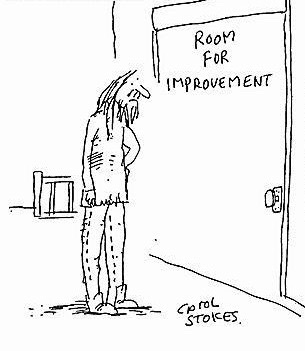
Good thing there's always room for improvement!
You’ve decided you want to retake the MCAT (if you haven’t decided yet, check out our blog post Should I Retake the MCAT?), and now it’s time to sit down and figure out how. Here are a couple things to consider as you start to make your study plan and head in to round 2.
1) Take a break
You’ve been off the MCAT books for at least a couple of weeks as you waited for your score, and might feel that you should jump back into studying right away so that you don’t fall too far behind. You need to take a break! While you were waiting for your score, your brain was probably still subconsciously stressing and worrying about your performance on the exam, so you owe it to yourself to take at least a few weeks off before you start seriously studying again. Focus on the other things going on in your life: school, work, extracurricular activities, family, anything to stop your brain from seeing passages in your sleep!
If you’re on a serious time crunch, like you’re rushing to get in an MCAT test before your application cycle starts (which I don’t recommend, see “Should I Retake the MCAT?”), take AT LEAST one full weekend after you get your MCAT scores before you start restudying.
2) Learn from your test
What happened on your first sitting of the exam? Did your brain cloud over during Verbal section and you felt like you couldn’t get through the passages? Or did you go blank on all of the organic chemistry questions and randomly guess? If you did more poorly across the board than you were expecting, make sure that your practice tests nearly exactly replicate the actual exam. That means no distractions, no snacks, and no bathroom breaks during the test. You might also want to consider how to manage test anxiety so that you don’t seize up during test day.
If there was one particular section that surprised you, you might be able to target your studying more towards that section while doing light review on the rest of the material so that you don’t lose it. Here’s where a tutor can help – they are really familiar with the exam and performance patterns, and can guide you in the right direction in terms of balancing your study time.
Make sure to remember that it is better to apply with a slightly lower score than to retake the exam and do worse overall or on one of the sections!
3) Balance your resources
If your exam didn’t go according to plan the first time, replicating your study strategy is not the way to go. If you have cheat sheets or broad review notes from your first go-around, those will be useful to add onto this time. However, you need to make sure that you are doing new sets of problems and new practice tests. Doing so will ensure you aren't lulled into a false sense of security by reviewing questions you have already seen.
MCAT resources can definitely be expensive, so search online for cheaper deals and ask around to see if friends have any they might be willing to give you. Khan Academy has some great free videos and practice passages that they teamed up with the AAMC to develop, so they’re a great resource to use. Generally, if you used the practice questions from one testing company (ex. Kaplan) to study for the test the first time, try to use practice questions from another (ex. Princeton Review) to re-study. Cambridge Coaching prioritizes Berkeley Review books for their great passage-based practice questions.
The one set of practice questions you should absolutely look at again is the AAMC practice tests. If you already took them once, don’t use them as a benchmark of your performance, since you have seen the questions before, but you should look at each passage and its associated questions to analyze patterns and strategies for how to approach the test again.
4) Hit the sweet spot in timing
Some people feel like the more time they dedicate to studying, the better they will do. This is not true! You need enough time to adequately review the material, but after a while your brain will get tired and not process that much more information.
If you already took the MCAT once, you probably feel at least somewhat comfortable with most of the material. Studying the second time should be more focused on strategy, test-taking skills, and targeting your weak spots, especially if your practice test scores were generally in your target range. Therefore, you might need less dedicated study time than you did at first. In this scenario, 1-3 months should be sufficient review. Review your material and notes from before, but focus more on practice taking passages, replicating exam scenarios exactly, and learning relaxation techniques that might help you curb anxiety.
But, if you didn’t feel ready the first time, or you felt like your content knowledge was lacking, take that into account and give yourself the time to seriously review the material out there. At least 3-4 months of focused studying that includes both a guided content review as well as regular practice exams is essential to performing well. The AAMC posts a topic outline with subjects in each section of the test that you are expected to know -- use this to go through each section carefully and make sure you have reviewed all of the subjects on their list.
Taking the MCAT again is a tough process, but with the right study techniques and balance, it is possible to do well and more importantly, perform at your best. Cambridge Coaching tutors can help you through this process!
For more relevant reading, check out these other blog posts, written by our MCAT tutors: When It Comes to Studying, Less Can Be More, 2 Simple Tips to Help You Start Your MCAT Prep, What You Need to Know About the 2015 MCAT. Looking to work with Nikita Saxena? Feel free to get in touch! Cambridge Coaching offers private in-person tutoring in New York City and Boston, and online tutoring around the world.


Comments